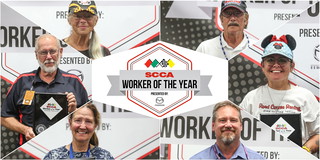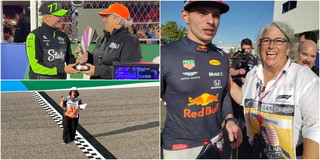
If you visited the Hoosier Racing Tire SCCA® Super Tour at NOLA Motorsports Park earlier this season – or really any event at the Big Easy track – you’re familiar with Lee Tilton, even if you don’t know it. Tilton is the Houston Region Worker of the Year for his efforts at NOLA (yes, you read that correctly, so bear with us), among other things, and in addition to his role for the SCCA, he waves a few other flags – including during pro weekends.
Living near New Orleans, Tilton took on the NOLA flagger training for all events at the track utilizing the SCCA Flagging & Communications manuals to put together a course for the paid staff there and build their base. That led to seven brand new corner marshals who joined SCCA to further their abilities and participate in a variety of events.
Those starting at the bottom have a role model to look at in Tilton. Like them, he started at one point as a brand-new corner marshal. Like so many others, the bug took hold. And why wouldn’t it? It gets you trackside at racing events – we’d call it the best seat in the house, except there’s not a lot of sitting.
Tilton will point out that there’s no one singular path to your F&C goals. He started as a local dirt track racer and volunteered to help with the IMSA street race in New Orleans in 1995. From there, it was a random collection of motorsports and SCCA-related activities – some Regional and National autocrossing and road racing, as well as volunteer work in Pit & Grid when not behind the wheel.
But it wasn’t until 2021 when he retired and finally got a Divisional F&C license that he began to take on more responsibility. On Labor Day weekend this year, he’ll be one of three Deputy Flag Chiefs at the FIA World Endurance Championship round at Circuit of the Americas in Austin, TX.
“During the event, our role is to visit each flag station to make sure our marshals are staying healthy and alert,” Tilton says. “We may briefly relieve a marshal for a break. We also take care of any housekeeping items for flag stations: communication or flag issues, requesting water for marshals, or even addressing sanitation issues. We also retrieve written incident reports from the stations to be delivered to race stewards.”
The work begins long before the cars go on track.
“Prior to racing activity, it is our responsibility to make sure the marshals have the tools they need: communication equipment, backup comms, flags, and all the other tools necessary for a safe event,” Tilton says. “We also spend a lot of time months before the event developing Flagging & Communications training material, reaching out to experienced marshals to volunteer, and vetting the marshal applicants. Later, we assign marshals to specific stations and roles based on experience and knowledge.”
It wasn’t necessarily that Tilton had some sort of special gift as a flagger, though obviously he’s very good. It’s that his involvement allowed him to network with others in the group, and his can-do attitude made him a person that others could depend on.
“The doors opened due to meeting Flag Chiefs and others interested in developing my skills,” he says. “I demonstrated that I was knowledgeable about racing regulations and flagging procedures. I showed that I was reliable, flexible, and willing to go the extra mile. The marshal community at the FIA and IMSA level is relatively small in the U.S. – reputation and word-of-mouth referrals are important, but nothing is better than being known as a professional, experienced marshal.”
One thing remains true: The SCCA is the most efficient way to move to what we’ll call “the big leagues,” which includes Hoosier Super Tour and the SCCA National Championship Runoffs®, in addition to IMSA, IndyCar, and FIA events like World Endurance Championship, Formula E, and, yes, F1. That has become even more true with new regulations this season.
“In 2024, FIA and IMSA are requiring that marshals have a specialties license,” Tilton explains. “The easiest way is to sign-up for the SCCA Trackside Program, and your information will be sent to your local SCCA Regional Flag Chief, who in turn will reach out to you to get you started. Become a member of SCCA and the Certified Regional F&C License training program will be available online. Work more to get your Divisional or National F&C License, work other tracks to expand your marshal network. There are many applicants to work FIA events, and the higher the license the better.”
Photos courtesy 2023 FIA WEC / FocusPackMedia - Harry Parvin and Lee Tilton










